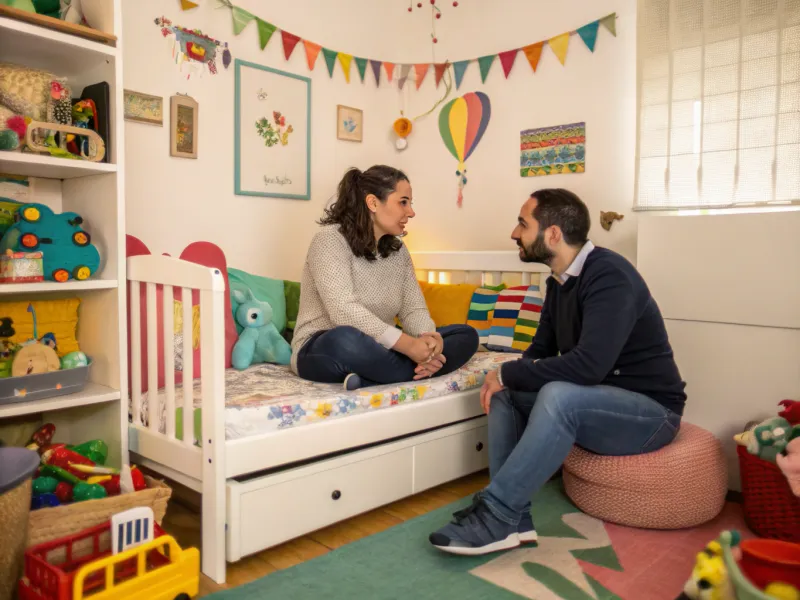Let’s talk about something that might not be on the top of the ‘fun conversation’ list, but is oh-so-important when you’re going through a divorce. Yes, I’m talking about open communication.
It’s the secret sauce to navigating this challenging time with grace and empathy. When we talk candidly and kindly, we allow ourselves to understand each other better, reduce misunderstandings, and pave the way for a smoother transition.
Why does this matter so much, you ask? Well, having structured, respectful, and intentional conversations is like building a bridge. It connects where you are now with where you want to be in the future.
These discussions help you stay on the same page with your spouse, even if you’re not in the same book anymore. It’s about being clear and considerate while respecting each other’s feelings and perspectives.
Now, let’s delve into the fun part—conversation starters! These aren’t just any questions; they’re carefully crafted to help you tackle everything from emotional well-being to future goals.
1. Emotional Well-being: How are you feeling about this transition?
How are you feeling about this transition? This might seem like a simple question, but it’s a doorway to understanding the emotional landscape of your divorce journey. It’s crucial to check in with each other, not just about logistics, but about feelings too.
Imagine sitting across a cozy cafe table with your spouse, the aroma of coffee in the air, and asking this sincerely. It’s a genuine gesture that says, ‘I care about your emotional well-being during this time.’
Now, you might not get a detailed answer right away, and that’s okay. This question is about opening a dialogue, not getting immediate solutions. Sometimes, just knowing that someone is willing to listen without judgment can be incredibly comforting. It paves the way for both of you to express emotions that might be bottled up.
This conversation starter sets a tone of empathy and understanding. It helps you both acknowledge the emotional complexities without getting lost in them. After all, divorce isn’t just a legal process; it’s deeply personal. By addressing feelings openly, you create a supportive environment where healing can begin.
2. Legal & Financial Matters: What are your biggest concerns about dividing assets?
What are your biggest concerns about dividing assets? This question can be a biggie, but approaching it head-on is essential. Picture sitting at your kitchen table, papers scattered, a laptop open, ready to discuss finances. It’s not just about numbers; it’s about future security and fairness for both of you. Starting this conversation shows that you’re ready to tackle the tough stuff with transparency.
When you ask this, you’re not just looking for facts. You’re seeking to understand the underlying worries your spouse might have. Is it about maintaining a certain lifestyle? Is there a fear of losing sentimental items? These insights can guide you towards a fair negotiation.
Approaching this topic with sensitivity is key. Ensure both of you feel heard, and remember, it’s about reaching a mutual agreement that respects both parties’ contributions. This conversation starter is your first step in transforming a potentially contentious issue into a cooperative discussion, paving the way for a smoother division process.
3. Co-Parenting & Children: How can we make this easier for the kids?
How can we make this easier for the kids? Parenting during a divorce can feel like walking a tightrope, but this question helps you focus on what truly matters—the well-being of your children. Imagine sitting on your couch with your spouse, flipping through a family photo album, and discussing this important topic.
This question invites both of you to think beyond your immediate feelings and focus on the children’s experience. Whether they’re young and confused or older and more aware, your kids need to know they’re still loved and secure. By asking this question, you open a space to brainstorm together, finding ways to maintain stability and continuity in their lives.
Addressing this with empathy ensures that both parents remain united in their parenting roles, even if they’re no longer partners. It’s about crafting a narrative that reassures your children that while things are changing, their safety and happiness remain a top priority. This conversation starter is a beautiful way to reaffirm your commitment to co-parenting with grace and love.
4. Future Goals & Expectations: What does an ideal post-divorce relationship look like to you?
What does an ideal post-divorce relationship look like to you? Picture a sunny afternoon, sitting on a park bench beside a serene lake, discussing this with your spouse. This question is about envisioning a future where both of you can thrive, even if it means being apart.
Understanding each other’s expectations post-divorce is crucial for setting boundaries and fostering respect. This question opens the door to discussing how you both envision your interactions moving forward. Do you see yourselves as friends? Co-parents? Occasional acquaintances? Each option carries its own set of dynamics.
Having this conversation helps to establish mutual goals and prevent future misunderstandings. It’s about creating a new normal where both parties feel respected and content. By aligning your visions, you lay the groundwork for a relationship that, while different, can still be fulfilling and supportive. This conversation starter is about building a bridge to a future where both of you can flourish independently while maintaining the respect and understanding cultivated during your partnership.
5. Emotional Well-being: What emotions have been the hardest for you to deal with during this process?
What emotions have been the hardest for you to deal with during this process? Divorce can be a whirlwind of emotions, and understanding which ones are most challenging for your spouse can foster empathy and support. Picture a quiet evening in your living room, sharing a cup of tea, and opening up about these feelings.
This question allows for vulnerability and honesty, providing a safe space to express emotions that might otherwise feel overwhelming. It’s an invitation to listen actively and offer comfort without judgment. By acknowledging these feelings, you both can begin to address them constructively.
This conversation starter promotes emotional healing by validating each other’s experiences. It emphasizes that while divorce is a shared journey, each person’s emotional experience is unique. By exploring these feelings, you can support each other in navigating the complex emotional landscape of divorce, fostering a sense of connection even as you part ways.
6. Legal & Financial Matters: Do you have any specific concerns about retirement funds or savings?
Do you have any specific concerns about retirement funds or savings? Retirement might seem like a distant worry, but it’s an important topic to address during a divorce. Picture sitting in a calm, professional office setting, financial charts spread in front of you, as you and your spouse discuss this.
This question aims to uncover any apprehensions regarding future financial stability. Whether it’s about maintaining a certain lifestyle or ensuring a comfortable retirement, understanding these concerns is essential. It’s about transparency and planning.
By addressing this topic early, you create an opportunity for equitable division and planning. Both parties can express their needs and work towards solutions that respect each other’s financial futures. This conversation is about mutual respect and understanding, ensuring that both of you feel secure about what lies ahead. It’s a proactive step in managing finances responsibly, even in the midst of personal changes.
7. Co-Parenting & Children: Are there specific traditions or routines you want to maintain for the kids?
Are there specific traditions or routines you want to maintain for the kids? Divorce changes many things, but it doesn’t have to disrupt cherished family routines. Imagine a sunny day in the park, your family enjoying a picnic, as you discuss how to preserve these moments.
This question focuses on continuity for the children, maintaining traditions that provide comfort and stability. Whether it’s weekend pancakes or holiday rituals, these routines can offer a sense of normalcy amid change.
By identifying these traditions together, you can ensure that both parents are aligned in preserving important family moments. It’s about finding ways to co-parent that honor the past while adapting to the present. This conversation starter allows both of you to focus on what truly matters—the happiness and well-being of your children, ensuring they continue to feel loved and secure during this transition.
8. Future Goals & Expectations: How do you see our roles changing as we move forward?
How do you see our roles changing as we move forward? This question invites an open discussion about how your relationship dynamics will evolve post-divorce. Picture walking together through a bustling city, discussing the changes ahead.
This conversation focuses on redefining roles in each other’s lives. Will you remain confidants, or does your relationship need to be strictly co-parenting? Discussing this helps in setting realistic expectations and boundaries.
By addressing these changes, both of you can adapt to new roles with clarity and respect. It’s about ensuring that both parties feel comfortable and understood in their new capacities. This conversation paves the way for a future where both of you can move forward without lingering uncertainties, helping to maintain a respectful and supportive relationship despite the changes.
9. Emotional Well-being: What support systems do you have in place, and how can I help?
What support systems do you have in place, and how can I help? Divorce can feel isolating, but having a solid support system can make all the difference. Imagine sitting in a tranquil garden, surrounded by blooming flowers, as you ask this supportive question.
This question emphasizes the importance of external support, whether it’s friends, family, or professionals. It opens the door to discuss how you can still be there for each other in a supportive capacity, even if the nature of your relationship is changing.
By identifying these support systems, you can ensure that both of you have the resources needed to cope with the emotional demands of divorce. It’s about being empathetic and understanding, offering help where you can. This conversation starter fosters a sense of solidarity and care, reminding both of you that you’re not alone in this journey.
10. Legal & Financial Matters: Have you considered any specific financial goals post-divorce?
Have you considered any specific financial goals post-divorce? This question encourages planning for the future, even as you navigate the present. Picture yourself in the corner of a cozy coffee shop, financial documents spread out before you, as you delve into this topic.
Discussing financial goals is about more than just numbers. It’s about envisioning what your life could look like independently. Are there specific achievements or benchmarks you’re aiming for? Understanding each other’s aspirations can lead to more informed decisions during the divorce process.
By aligning on financial goals, both parties can work towards achieving stability and independence. This question allows you to address any disparities and find common ground, ensuring both of you feel secure and prepared for the future. It’s a proactive step towards building a new life, filled with confidence and clarity.
11. Co-Parenting & Children: How do you envision sharing responsibilities for school activities?
How do you envision sharing responsibilities for school activities? Co-parenting involves more than just weekends and holidays; it’s about being present in everyday moments too. Imagine sitting in a school meeting, surrounded by other parents, as you discuss this important aspect.
This question addresses the practicalities of co-parenting, focusing on how to maintain a consistent presence in your children’s education. Whether it’s attending parent-teacher conferences, helping with homework, or cheering at sports events, being actively involved is crucial for your child’s development.
By discussing these responsibilities, both parents can ensure they remain engaged and supportive, even if their familial structure has changed. This conversation starter lays the groundwork for a collaborative approach to parenting, ensuring your child’s academic and emotional needs are met consistently. It’s about creating a unified front that prioritizes the well-being and success of your children.
12. Future Goals & Expectations: What are your hopes for our future interactions?
What are your hopes for our future interactions? Divorce changes relationship dynamics, but it doesn’t have to end them entirely. Imagine sitting in a quiet cafe, the aroma of freshly brewed coffee around you, as you explore this question with your spouse.
This conversation is about setting expectations for how you’ll interact moving forward. Do you hope to remain friends? Are there boundaries you need to establish? By articulating these hopes, both parties can navigate their new relationship with clarity and mutual respect.
Discussing future interactions helps prevent misunderstandings and fosters a positive environment for any relationship that remains. It ensures both parties feel comfortable and respected, laying the foundation for a future where interactions are meaningful and fulfilling, even if they are less frequent than before. This conversation starter is about crafting a future where both of you can coexist amicably, supporting each other in new ways.
13. Emotional Well-being: How do you handle stress, and what strategies work best for you?
How do you handle stress, and what strategies work best for you? Divorce is undoubtedly stressful, and understanding each other’s coping mechanisms can be a game-changer. Picture practicing yoga together in your living room, a peaceful space filled with natural light, as you discuss this.
This question encourages sharing personal strategies that have been effective in managing stress. Whether it’s meditation, exercise, or creative outlets, knowing what works for your spouse can foster empathy and support.
By exploring these strategies, both of you can find ways to manage stress constructively, ensuring it doesn’t overwhelm the divorce process. This conversation starter promotes a healthy approach to stress management, encouraging both parties to support each other and cultivate resilience during this challenging time. It’s about building a toolkit of strategies that help both of you navigate the emotional ups and downs with grace.
14. Legal & Financial Matters: How comfortable are you with our current financial advisor or do we need to seek a new one?
How comfortable are you with our current financial advisor, or do we need to seek a new one? This question is crucial when sorting through financial matters during a divorce. Imagine sitting in your financial advisor’s office, surrounded by charts and graphs, as you discuss this matter.
The right financial advisor can make a significant difference in how well you navigate financial transitions. By addressing any discomfort or dissatisfaction with your current advisor, you open the door to finding one who meets both of your needs.
This conversation starter is about ensuring both parties feel confident in the guidance they receive. It’s about transparency and collaboration, making sure that financial decisions are made with both parties’ best interests in mind. This question underscores the importance of mutual satisfaction and trust in those who help manage your financial future during and after divorce.
15. Co-Parenting & Children: Are there any particular topics you think we should discuss with the kids together?
Are there any particular topics you think we should discuss with the kids together? Communication with children during a divorce is critical, and this question highlights the importance of presenting a united front. Imagine sitting on your child’s bed, surrounded by their favorite toys, as you plan these discussions.
This question encourages both parents to identify key topics that need to be addressed together, ensuring consistency in messaging. Whether it’s changes in living arrangements or new routines, discussing these topics as a team helps reassure your children that both parents are in sync.
By planning these conversations together, you create a supportive environment that prioritizes your children’s emotional well-being. This conversation starter emphasizes the importance of clear and compassionate communication, ensuring that your children feel secure and loved throughout the transition. It’s about providing your kids with the reassurance they need, facilitated by the collaborative effort of both parents.
16. Future Goals & Expectations: Are there any unwritten rules or boundaries you’d like to establish?
Are there any unwritten rules or boundaries you’d like to establish? Divorce redefines relationships, and this question helps clarify the new terms. Imagine sitting at your rustic kitchen table, a notepad ready to capture these important boundaries.
This conversation is about openly discussing personal limits and expectations. Whether it’s about visiting schedules, social media etiquette, or family gatherings, setting these boundaries helps prevent misunderstandings and conflicts.
By articulating these unwritten rules, both parties can respect each other’s space and needs, fostering a harmonious post-divorce relationship. This conversation starter is about creating a clear framework that supports mutual respect and understanding, ensuring that both of you can move forward with clarity and confidence.
17. Emotional Well-being: Are there any activities or hobbies that bring you peace during this time?
Are there any activities or hobbies that bring you peace during this time? Hobbies can be a sanctuary during the emotional upheaval of divorce. Picture a peaceful walk through a sun-dappled forest as you discuss this topic.
This question encourages sharing personal passions that offer solace and joy. Whether it’s painting, hiking, or cooking, these activities can provide a much-needed escape and help both of you manage stress.
By discussing these hobbies, you might even discover shared interests that could foster positive interactions. This conversation starter promotes self-care and personal growth, encouraging both parties to find joy amidst the challenges. It’s about nurturing individual well-being and embracing activities that contribute to emotional resilience and happiness.
18. Legal & Financial Matters: Are there specific debts or liabilities you’re concerned about managing?
Are there specific debts or liabilities you’re concerned about managing? Financial clarity is crucial during divorce, and addressing liabilities is an important step. Imagine a meeting with a financial planner, debt-related documents spread out before you, as you tackle this topic.
This question encourages transparency about debts that could impact both parties post-divorce. Whether it’s a mortgage, credit card bills, or personal loans, understanding these liabilities ensures informed decision-making.
By discussing these concerns openly, both parties can devise strategies to manage debts effectively. This conversation starter supports equitable financial planning, ensuring that both of you can move forward with confidence, knowing that potential financial pitfalls are being addressed thoughtfully and collaboratively.
19. Co-Parenting & Children: How do you propose we handle holidays and special occasions?
How do you propose we handle holidays and special occasions? Celebrations can be tricky during a divorce, but this question helps ensure they remain joyful for the children. Picture decorating a Christmas tree together, the warm glow of lights surrounding you, as you discuss this.
This conversation focuses on creating a plan for sharing holidays and special moments. Whether it’s alternating years or sharing specific days, a clear plan ensures that celebrations remain a source of joy, not stress.
By discussing this calmly, both parents can find a solution that respects each other’s desires while prioritizing the children’s happiness. This conversation starter emphasizes the importance of flexibility and cooperation, ensuring that holidays remain a time of love and connection for your family.
20. Future Goals & Expectations: Do you have any long-term goals that I should be aware of?
Do you have any long-term goals that I should be aware of? Even as you part ways, understanding each other’s future plans can foster respect and cooperation. Imagine reviewing a vision board together, filled with dreams and aspirations, as you discuss this.
This question encourages transparency about ambitions and plans that might impact your ongoing relationship. Whether it’s career goals, relocation plans, or personal achievements, being aware helps in making informed decisions.
By sharing these goals, both parties can support each other in achieving them, even if their paths are diverging. This conversation starter promotes a forward-thinking mindset, ensuring that both of you feel respected and understood as you pursue your individual dreams and aspirations.
21. Emotional Well-being: Are there any unresolved feelings or issues you’d like to address?
Are there any unresolved feelings or issues you’d like to address? Closure is an important part of moving forward, and this question invites a heartfelt conversation. Picture sitting on a tranquil beach, the sound of waves soothing your thoughts, as you delve into this topic.
This question provides an opportunity to clear the air, addressing any lingering issues that might hinder a healthy separation. Whether it’s past disagreements or unspoken concerns, discussing these openly can bring closure.
By addressing unresolved feelings, both parties can find peace and clarity, ensuring that their future interactions are free from past burdens. This conversation starter emphasizes the importance of emotional closure, fostering a sense of freedom and healing as both of you embark on new journeys.
22. Legal & Financial Matters: Are there any specific assets you feel strongly about keeping, and why?
Are there any specific assets you feel strongly about keeping, and why? Asset division can be complex, but understanding emotional attachments can guide fair decisions. Imagine sitting in your sunlit home office, reviewing a list of assets, as you discuss this matter.
This question highlights the importance of recognizing sentimental value, not just financial worth. Whether it’s a family heirloom or a shared home, understanding why certain assets matter can guide equitable decisions.
By discussing these preferences, both parties can approach asset division with empathy and understanding. This conversation starter ensures that both of you feel respected and valued, paving the way for fair and thoughtful asset division that honors both emotional and practical considerations.
23. Co-Parenting & Children: How can we best support each other’s roles as parents?
How can we best support each other’s roles as parents? Co-parenting is a partnership, and this question emphasizes collaboration over competition. Imagine discussing this at a playground, with the joyful sounds of children in the background.
This question promotes understanding and cooperation, focusing on how each parent can support the other’s role. Whether it’s sharing responsibilities or respecting each other’s parenting styles, collaboration is key.
By exploring this topic, both parents can ensure that their efforts are aligned, creating a supportive environment for their children. This conversation starter fosters a spirit of unity and respect, emphasizing that despite the changes, you are still a team when it comes to your children’s well-being.
24. Future Goals & Expectations: Are there any future events or milestones you’d like us both to attend?
Are there any future events or milestones you’d like us both to attend? Life is full of important moments, and this question ensures both parents remain part of them. Imagine sitting in your cozy living room, a calendar marked with family events before you, as you discuss this.
This conversation highlights the importance of shared experiences, even after divorce. Whether it’s graduations, birthdays, or new arrivals, discussing these events ensures that both parents remain involved.
By planning these moments together, both parties can maintain a presence in their children’s lives, fostering a sense of continuity and love. This conversation starter emphasizes the importance of shared memories, ensuring that significant milestones continue to be celebrated together, strengthening family bonds despite the new dynamics.
25. Discussing Household Responsibilities
Dividing household responsibilities can often become a gray area during divorce discussions. Taking the time to address who will handle specific chores can alleviate future conflicts. It’s helpful to list current responsibilities and decide together who can manage them moving forward.
Consider each other’s strengths and existing commitments when making these decisions. This conversation can also uncover any previously unspoken desires to swap or change roles within the household. Ensuring both parties feel comfortable with the arrangements is key.
Regularly revisiting this topic as circumstances change can maintain harmony and prevent misunderstandings. Flexibility and open dialogue will support a smoother transition.
26. Revisiting Shared Values
Shared values often hold a relationship together, and revisiting these can provide clarity moving forward. Initiate a discussion on the core beliefs or values that have been important to both of you. This conversation can help in deciding which of these still resonate and how they might impact your decisions post-divorce.
Revisiting these values might uncover common ground, providing a foundation for a civil and respectful relationship after separation. Additionally, understanding shifts in personal priorities can aid in renegotiating terms of the relationship.
It’s crucial to approach this conversation with an open mind, acknowledging that values may evolve over time. Embrace these changes as part of personal growth and mutual learning.
27. Exploring New Hobbies
Finding new passions can be a fulfilling way to transition through divorce. Engage in a conversation about hobbies or activities you both wish to pursue individually. Discussing new interests can reveal shared passions or even inspire you to try something new together, fostering a positive environment.
This exploration can lead to personal growth and boost your well-being, providing a sense of accomplishment during challenging times. Encourage each other to take part in activities that bring joy and satisfaction, and respect these new pursuits.
Moreover, this dialogue can help set boundaries around personal time, ensuring both partners have space to explore their interests independently. Establishing this understanding can promote mutual respect and support.




























